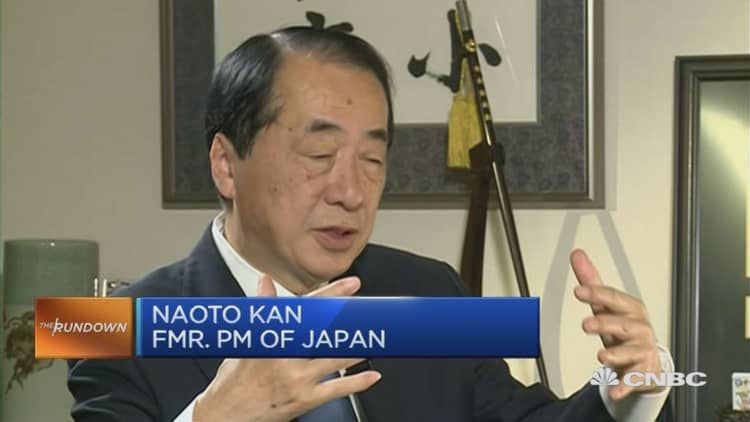Japan's central bank kept its powder dry at its March policy review on Tuesday, with economists only expecting further stimulus in July as the central bank waits to assess the impact of its uncharted entry into negative interest rates.
After a two-day monetary policy meeting that began on Monday, the Bank of Japan (BOJ) maintained its commitment to raise the monetary base by 80 trillion yen annually and left the rate it charges commercial banks on certain reserves at 0.1 percent.
The benchmark Nikkei stock index traded down 0.4 percent following the decision, while the yen was little changed at 113 per dollar.
If needed, additional easing steps will be taken to hit 2 percent inflation, the BOJ said, adding that it will review the ratio of reserves for which negative interest rates are applied every three months.
Money reserve funds (MRFs) will be excluded from the negative rate, the BOJ said. Instead, a zero rate will be applied to MRFs.
Before Tuesday's market open, the Nikkei business daily reported that the central bank was looking to downgrade its assessment of a moderate economic recovery. At Tuesday's meeting, the BOJ said the economy remained in a gradual recovery, attributing recent weakness in exports and output due to a slowdown in emerging markets.
The central bank also said it will monitor the impact of recent financial market ructions on business confidence, warning it could delay a transition from Japan's decades-old deflationary mindset.
The BOJ blindsided global markets on January 29 by unexpectedly announcing it will apply a negative rate to some excess reserves that financial institutional place at the bank, following the Swiss National Bank and the European Central Bank in effectively charging depositors for the privilege of parking their spare cash.
The BOJ's move raised two-fold concerns. One, central banks may compete to lower rates deeper into negative territory, sparking a tit-for-tat currency devaluation fight. Secondly, negative rates could weigh on bank profits.
While Japan's depressed economy may warrant more stimulus at present as core consumer prices are still well below the BOJ's 2 percent inflation target, the central bank isn't likely to move until July, according to most analysts.
"The NIRP [Negative Interest Rate Policy] component of the current policy only took effect in mid-February, and we believe the BOJ would prefer to take some time to monitor how negative rates affect the behavior of financial institutions and the real economy," Barclays said in a recent note.
"Further rate cuts could be more effective if the effects from the initial cuts to negative territory are demonstrated first, especially amid growing doubts about the effectiveness of monetary policy globally."
Moreover, recent market volatility doesn't support the case for lowered rates.

"The perverse and unintended yen surge post-negative rates alongside Nikkei sell-off led by banking stocks, (ostensibly triggered by negative interest rate worries) tighten overall monetary conditions and accentuate downside all else equal. So the case to further negative rates at this point is flimsy, if not risque. What's more, even tweaks to the policy could benefit from more considered options," said Vishnu Varathan, senior economist at Mizuho Bank.
Like Barclays, he's also betting on more easing during the second quarter.
Societe Generale estimates the overall probability of more stimulus in 2016 to have increased to 30 percent, from 10 percent previously.
Another factor supporting the case for delayed stimulus is the closely-watched Upper House parliamentary elections in July. If Prime Minister Shinzo Abe's ruling party can win a two-thirds majority, he will be able to implement key reforms, including plans to boost the number of women in the workforce and a revision of the pacifist Constitution.
Until July, the BOJ may aim for flexible fiscal policy, the second arrow of Abenomics, opting only to cut rates after the election, Barclays noted.
"The BOJ is also experiencing significant backlash because of the anger and frustration that it [negative rates] has caused for the public, flagged Kathy Lien, managing director of FX strategy at BK Asset Management, referring to recent reports by The Wall Street Journal of senior citizens buying safes to hoard cash amid fears that commercial banks may soon charge them interest on deposits.
"While Japan needs another round of stimulus, the earliest that we could see more easing from the BOJ is July," Lien said.


